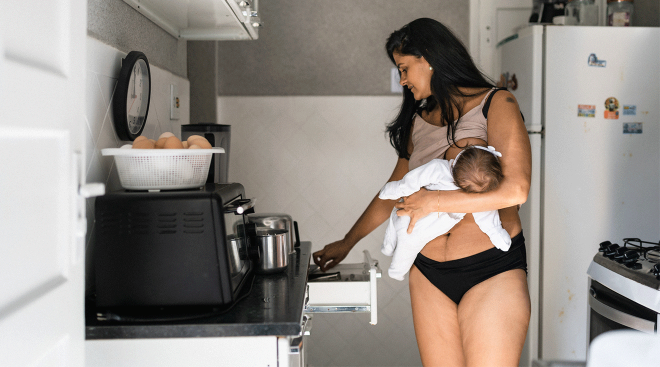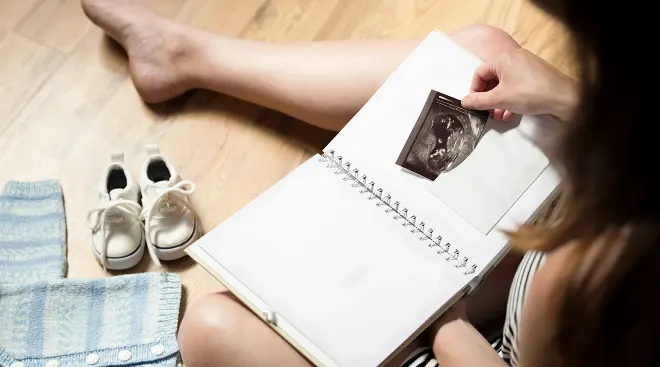- Welcome to the third trimester! You’re in the home stretch now—panic and excitement may be setting in. You’ll be visiting your ob-gyn or midwife more often, as you're heading toward the finish line. Expect to have an appointment every two weeks.
- Baby isn't leaving you a lot of room. Their cramped quarters may result in you experiencing some unpleasantness: shortness of breath, occasional incontinence and general discomfort.
- You’ve been feeling baby move and groove for a few weeks. Now is the time to start doing kick counts. Basically, you want to feel at least 10 movements in a two-hour span. (More on that, below!)
At 28 weeks pregnant, sleep deprivation might come into play. If you find yourself up in the middle of the night, try to do something relaxing. (This isn't the time to vacuum the house from top to bottom.) Instead, read a book, drink a pregnancy-safe herbal tea or listen to soothing music. Rest is important—and you're about to be very busy!
Inside your 28 weeks pregnant belly, baby is starting to develop more fat, so their once-wrinkly skin is starting to get smoother. In pretty amazing news, baby is practicing breathing, and their lungs are getting more mature every day.
If you’re having a boy, testicles usually descend from the abdomen into the scrotum by around week 27 to week 28 of pregnancy. Here’s an interesting tidbit: Baby boys and girls have the same set of sex organs for the first few weeks after conception. Around week 9 of pregnancy, the Y chromosome in boys directs the development of testicles—which produce male hormones that drive the formation of sex organs (like the penis).
In week 28 of pregnancy, baby’s immune system continues to develop—guided in part by the placenta. The womb was long considered to be a sterile environment that shielded baby from outside microbes. Baby’s immune system development was thought to be driven entirely by antibodies inherited from Mom. However, some researchers (controversially) argue that evidence shows babies are born with a unique microbiome (or collection of microbes) at birth, suggesting they may be exposed to bacteria in the womb.
In the meantime, baby will keep getting bigger and stronger. Of course, they need a few more finishing touches before they’ll be ready to meet you.
How big is baby at 28 weeks?
At 28 weeks, baby is the size of an eggplant. Putting on layers of fat, baby now measures about 14.8 inches from head to toe and weighs in around 2.2 pounds.
What does baby look like at 28 weeks in the womb?
If you could peek inside your 28 week pregnant belly, you’d see baby going through periods of activity (hello, tap dancing on your bladder!) and periods of rest. In fact, baby can now experience REM sleep, which means baby is having dreams! That rapid eye movement continues when baby’s awake, though, because now they can blink too.
28 weeks pregnant is how many months?
Have you found yourself wondering, “how many months are you pregnant for again?” Technically, pregnancy is 40 weeks. That doesn’t break so cleanly into months, but if we had to say, pregnancy is a little shy of 10 months long. If you’re trying to figure out 28 weeks in months, we’ve got you covered: When you hit the 28-week mark, you're seven months pregnant. So what trimester is 28 weeks? This week, you’re embarking on your third trimester. You're doing great!
28 week ultrasound
Now that you’re 28 weeks pregnant, you’ll start seeing your OB or midwife twice per month (or every two weeks). If your pregnancy has been uncomplicated, don’t expect to get a 28-week ultrasound at this appointment. Even though you’d probably love to get a peek inside that 28 weeks pregnant belly, it’s simply not necessary to have more than a couple ultrasounds throughout your pregnancy, unless your provider has a reason to monitor you extra carefully. Try to be patient! Soon baby will be here and you’ll get to gaze at them as much as you want.
As your body gets more and more crowded by your growing 28-week fetus and starts prepping for baby's arrival, you might be noticing some new pregnancy symptoms. These are common at this stage of the game:
Trouble sleeping
As you get closer to your due date, you'll likely have more and more trouble getting ZZZ’s (which stinks, because you’re beat!). It could be hormones or nerves—or both!—causing your inability to snooze.
Shortness of breath
Baby continues to crowd your lungs and diaphragm, making it tougher to catch your breath. Give yourself permission not to push too hard and to take breaks.
Aches and pains
The third trimester can be really uncomfortable due to hormone fluctuations and the general toll pregnancy is taking on your body. (We’re especially talking to you mamas who are 28 weeks pregnant with twins!) To manage, try yoga, stretch your body, swim, walk and/or convince your partner to give you a gentle prenatal massage. Try wearing a maternity support belt if you’re on your feet a lot. (Not sexy, we know, but it can relieve some of the pressure that’s making you so achy.)
Braxton Hicks contractions
These practice contractions might be getting stronger, more noticeable or more frequent as your body gets ready for labor. Monitor them and be sure that the contractions are only occasional. If they’re regular, continue getting closer together and don’t stop when you switch positions, you could be in preterm labor and should call your provider ASAP.
Leaky boobs
Your breasts may already be producing baby's first food, a yellowish substance called colostrum. And surprise—some of it might actually come out before baby does!
What to expect at 28 weeks pregnant
Now that you’ve reached your third trimester (yay!), you’re about to start getting truly uncomfortable (boo!). As your 28 weeks pregnant belly continues to grow, it’ll get harder and harder to get (and stay) comfortable. This will be frustrating at times, but just remember—all this discomfort will bring baby to you!
Your OB will probably measure your 28 weeks pregnant belly at your prenatal appointment. This week, fundal height—the distance from your pubic bone to the top of your uterus—should be about 26 to 30 centimeters. Knowing you’re measuring within that normal range is reassurance that baby’s growth is on track and that baby is in the right position, since a breech or sideways position could affect the measurement. For women who are 28 weeks pregnant with twins, don’t stress too much over your fundal height measurements, as it’s harder for doctors to estimate an “average” for twin pregnancies.
Doctors recommend you start doing kick counts at 28 weeks. You’ll be keeping tabs on how often baby is moving and whether their movements are consistent from day to day. Here’s how you do it: Pick a time of day and set a timer. See how long it takes to get to 10 fetal movements—it should be less than two hours. The next day at the same approximate time, do the same thing. Record the times each day, and you’ll start to find an average range for baby. It’s great reassurance that they’re doing well in there. If anything seems inconsistent, let your doctor know.
Regarding hemorrhoids, try to make sure that you're not also constipated. If you’re constipated, talk to your doctor about it and introduce a stool softener, more fiber and hydration into your diet. Certain over-the-counter hemorrhoid creams are okay to use too.
Here’s how to take charge of your physical and mental health during the third trimester (aka home stretch) of pregnancy.
Time to start counting kicks
Kick counts can be simultaneously fun (you get to interact with baby!) and anxiety-inducing (why has it been so long between kicks?!). Try doing your kick counts at the same time every day and at a time that baby is typically the most active. Remember, wiggles, bladder stomps, tumbles and pokes count too. Also, remember that baby sleeps, so you might have to wake them up!
Time to make some decisions
Who knew that having a baby came with so many decisions! What kind of birth to have, what to name baby, whether or not to circumcise and on and on and on. Some decisions will be easier than others. You can listen to your gut, but it may also be helpful to talk any decisions over with trusted friends, a partner or your doctor to help you arrive at an answer.
Get your pediatrician lined up
If you haven’t yet, it’s important to choose a pediatrician (yet another choice!) and make sure they know to expect a new patient in the next 12 weeks. The pediatrician will need to see baby within a few days of being born (exactly how soon depends on several factors), so it’s important to have everything lined up in advance.
Get all your new stuff ready
Baby will be here before you know it, so it’s a good idea to have things ready early (especially in case baby comes early too). Wash some baby clothes and baby sheets, set up baby’s nursery and start stocking up on some postpartum recovery essentials. It’ll be go time soon!
Frequently Asked Questions
Should sneezing be painful during pregnancy?
If you feel a sharp pain in your lower belly, hips or pelvic area when you sneeze, it’s likely a normal part of being pregnant. Beginning in the second trimester, your growing baby bump stretches and pulls on your round ligaments—strips of connective tissue on each side of your abdomen that help hold your uterus in place. To reduce the discomfort, try folding forward at the hips before you sneeze, so you tug less on the ligaments when your muscles contract.
Is nail polish safe to use during pregnancy?
Research suggests that an occasional manicure during pregnancy is not risky for you or baby. A number of chemicals are used in nail polish—hence the characteristic odor of nail salons. But when you use nail polish, you’re only exposed to a very small amount (your baby even less), and very little is absorbed through the nails and skin. That said, it’s a good idea to choose a well-ventilated salon and/or ask the nail technician to open the door during your service, to reduce your exposure to nail polish fumes.
Still concerned? Look for polishes with “3-free” or “7-free” on the label, which means they contain fewer of the chemicals that (in much larger quantities) have been linked to potential health risks.
How do I make a birth plan?
A birth plan organizes your wishes for your labor and delivery and can help both you and your practitioner prepare for the big day. It may help you to feel more confident going into labor and satisfied with how your experience ultimately goes down.
Using a template can help you to identify various factors that are important to you, such as whether you want an epidural, who will be with you in the delivery room, props you’d like to use (such as a birthing ball or bathtub), and instructions on feeding and skin-to-skin care. Stay flexible and remember that it’s not always possible to stick to every request on your plan, as unforeseen complications may occur.
Is pregnancy 9 or 10 months?
A full-term pregnancy is technically counted as 40 weeks—or 10 months—long. Bear with us: The math gets confusing. The first two weeks of pregnancy are preconception, beginning with the first day of your menstrual period. About two weeks later, you’ll ovulate (or release an egg), which is fertilized by sperm within a day.
Even then, you won’t know you’ve conceived until the end of the fourth week of pregnancy: Levels of hCG (the pregnancy hormone) are too low to be routinely detected by most urine pregnancy tests until after your missed period. That means, in practice, you’ll actually only spend nine months (at most) knowing you’re pregnant.
When are babies lungs fully developed?
The lungs are actually the last of baby’s organs to fully develop; this occurs at about 36 or 37 weeks of pregnancy. That said, until you deliver, baby’s lungs aren’t actually functioning. In the womb, the lungs are filled with amniotic fluid instead of air. Baby gets the oxygen they need through your blood, delivered via the placenta and umbilical cord.
At birth, babies have about 50 million air sacs, or alveoli—a number that will increase rapidly in the first six months of life. The lungs of babies born before 37 weeks sometimes don’t produce surfactant, a grease-like substance that keeps them lubricated. If necessary, artificial surfactant can do the job until a baby’s lungs are ready to take over.
Hitting the third trimester felt like such a major milestone. Pregnancy wasn't easy, and I knew the last 12 weeks wouldn't be without challenges. But knowing we were at the home stretch helped get that extra push of motivation I needed.
Please note: The Bump and the materials and information it contains are not intended to, and do not constitute, medical or other health advice or diagnosis and should not be used as such. You should always consult with a qualified physician or health professional about your specific circumstances.
MedlinePlus, Prenatal Care in Your Third Trimester, April 2022
Nemours KidsHealth, Why Do Some Women Feel Short of Breath During Pregnancy?, January 2023
Cleveland Clinic, Pregnancy and Bladder Control, August 2023
Mayo Clinic, Pregnancy Week by Week: 3rd Trimester Pregnancy: What to Expect, March 2022
Cleveland Clinic, Kick Counts, July 2022
Sleep Foundation, Sleeping While Pregnant: Third Trimester, March 2023
Progress in Lipid Research, Adipose Tissue Development and Lipid Metabolism in the Human Fetus: The 2020 Perspective Focusing on Maternal Diabetes and Obesity, December 2020
Mayo Clinic, Pregnancy Week by Week: Fetal Development: The 2nd Trimester, June 2022
Cleveland Clinic, Amniotic Fluid, June 2022
National Library of Medicine, Embryology, Pulmonary, August 2023
American Pregnancy Association, 28 Weeks Pregnant
PLOS One, Eye Movement Activity in Normal Human Fetuses Between 24 and 29 Weeks Gestation, July 2017
Cleveland Clinic, Fetal Development, March 2023
American College of Obstetricians and Gynecologists, How Long Does Pregnancy Last?, October 2020
Scientific Reports, The Effect of Pregnancy on Maternal Cognition, May 2021
Cleveland Clinic, Ultrasound in Pregnancy, September 2022
March of Dimes, Exercise During Pregnancy, September 2020
American Pregnancy Association, Prenatal Massage Therapy
American Pregnancy Association, Back Pain During Pregnancy
National Library of Medicine, Braxton Hicks Contractions, August 2023
Cleveland Clinic, Colostrum, February 2022
Mayo Clinic, Pregnancy Week by Week: What’s the Significance of a Fundal Height Measurement?, December 2022
Cleveland Clinic, Fundal Height, January 2022
Maternal Fetal Medicine Associates, Twin Pregnancies and Fundal Heights, April 2023
Nemours KidsHealth, Choosing a Pediatrician for Your New Baby, September 2019
U.S. Department of Health and Human Services Office of Disease Prevention and Health Promotion, Make the Most of Your Baby’s Visit to the Doctor (Ages 0 to 11 Months), March 2023
Learn how we ensure the accuracy of our content through our editorial and medical review process.
Navigate forward to interact with the calendar and select a date. Press the question mark key to get the keyboard shortcuts for changing dates.















































